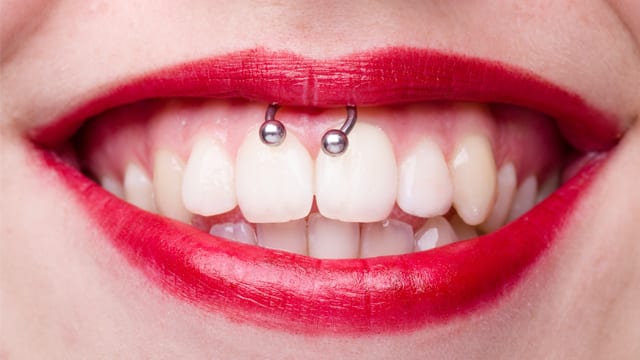As you read on, we'll look into what happens when you pierce your gums. We'll also look at the risks involved as well as the best way to care for your piercing if you already have one or decide to get one.
What Happens When You Pierce Your Gums?
One of the first things to know about smiley piercings is that you aren't technically piercing your gums. The piercing actually goes through the frenulum (the small flap of tissue that connects the gums to the lips). As you may know, one of the most common locations for a gum piercing is on the upper part of the mouth, right above the two front teeth. You can also have a piercing on the bottom part of the mouth where the tissue connects the lower lip to the gums. This is sometimes called a "frowny piercing."
A lot of people like gum piercings because the piercing itself is mostly hidden. And when your mouth is relaxed or closed, no one can see the jewelry. But when you smile, the decoration peeks out — making your smile glow.
What Are the Risks of Gum Piercings?
You may be wondering, do smiley piercings ruin your teeth? The truth is that all body piercings come with risks. As the American Dental Association (ADA) points out, oral piercings can be particularly risky since millions of bacteria live in the mouth. There's a greater risk of infection when you pierce the inside of your mouth versus getting your ears pierced because of the bacteria.
Other complications of a gum piercing include:
- Infection and swelling
- Bleeding
- Scarring
- Embedded jewelry that requires surgical removal
- Unusual discharge from the piercing
- Damage to your teeth and gums. Even a small metal ring can wear away at the enamel over time as it rubs against your front teeth, and it may irritate the gum and inner lip tissue.
- Allergies to metal jewelry. This is especially true when surgical-grade metal isn't used. People with metal sensitivity will usually notice symptoms right away.
If you get a gum piercing and complications arise, schedule an appointment with your dentist right away. They're trained to monitor and manage this kind of thing and will link you with a doctor when needed.
How Do You Care for the Piercing?
If you decide to get an oral piercing, caring for it correctly is essential. Your care will help to make sure that it doesn't become infected or cause any other issues.
It's also important to choose a professional piercing shop with good customer reviews. After you get the piercing, make sure to ask your piercing specialist to show you how to properly clean your piercing site and take your jewelry in and out.
Although the ADA advises against gum and oral piercings, they offer some advice to help care for the area if you already have a piercing to reduce the risk of irritation or infection. They recommend using a mouth rinse after every meal to keep the piercing site clean.
It's also a good idea to remove the piercing from time to time to protect your teeth and gums from damage. For example, if you play sports or are very active, take out the piercing. That way, there's no chance of it ripping or getting knocked against your teeth. Also, it's helpful to protect your teeth with a mouthguard.
Of course, brushing two times a day and flossing daily is always essential, especially with a piercing. It's also important to note that if you have an oral piercing, periodic checks with your dental team can help prevent, intercept, and treat complications that arise while also keeping your oral care on point.
Now you know all about smiley piercings and the risks associated with them, including infection and allergies. Although the ADA doesn't recommend oral piercings of any kind, you now know how to care for a smiley piercing if you decide to get one. The key is to keep the area clean, rinse after meals, and stay in close contact with your dentist. If you already have a smiley piercing but would like to close it up, talk to your dentist and start the process right away. It'll help ensure that you don't experience any issues with it down the road.
Oral Care Center articles are reviewed by an oral health medical professional. This information is for educational purposes only. This content is not intended to be a substitute for professional medical advice, diagnosis or treatment. Always seek the advice of your dentist, physician or other qualified healthcare provider.
ORAL HEALTH QUIZ
What's behind your smile?
Take our Oral Health assessment to get the most from your oral care routine
ORAL HEALTH QUIZ
What's behind your smile?
Take our Oral Health assessment to get the most from your oral care routine
Join Us
Get the best of your oral health routine and take it to the next level with expert advice, recommendations, products and solutions and special offers.
Join Us
Get the best of your oral health routine and take it to the next level with expert advice, recommendations, products and solutions and special offers.












.png)


